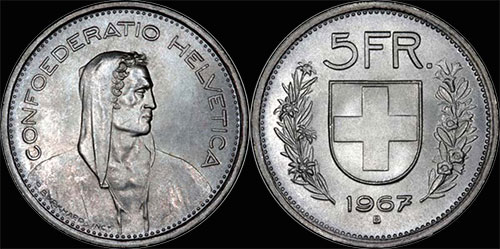
Numismatic News | Posted on June 9, 2016 by NMN | By Richard Giedroyc
Denmark and Sweden may be leading the charge towards a cashless society, but Switzerland, that bastion of international banking, doesn’t see it that way.
Not only are the Swiss sold on the idea they want to retain their coins and bank notes, but a new series of bank notes slated to be released shortly will once more include the 1,000-franc (about $1,040 U.S.) denomination despite an outcry from law enforcement regarding the high value note.
The European Union surrounds land-locked Switzerland. The highest denomination bank note in use in the EU is the 500 euro, equal to about $567 U.S. Officials there are seriously considering withdrawing that bank note because it is popular with criminals and those trying to avoid detection when making large transactions. Pressure has been put on Switzerland to follow; however, according to information provided on April 4 by the Bloomberg news service, Switzerland has no plans to reconsider its new notes, that will be in denominations of 10, 20, 50, 100, 200 and 1,000 francs. The highest denomination coin in circulation in Switzerland is the 5 franc, which is also one of the highest value circulating coins anywhere.
What may surprise proponents of the cashless society issue is that Switzerland not only plans to continue to issue coins and bank notes as always, but that according to surveys the Swiss like it that way.
Bank for International Settlement data for 2014 indicates debit and credit card transactions in Switzerland amount to about a third of similar transactions in Canada and Great Britain during the same time despite the availability of sufficient payment terminals at which the cards could be used.
Swiss Finance Minister Eveline Widner-Schlumpf told Parliament in 2014 that about 20 percent of all purchases are made in cash. This includes large value jewelry purchases. A controversial anti-money laundering law has been recently enacted that establishes a maximum value of 100,000 francs allowable for cash transactions. Switzerland has a public data security officer. Anonymous banking continues to be allowed for domestic citizens, although it is no longer permitted for foreign depositors.
Privacy continues to be a major concern among the Swiss, which is a major reason why the cashless society concept has not taken hold. According to the April 4 Bloomberg report, “A new train travel card – similar to London’s Oyster card or New York’s MetroCard – provoked concerns authorities might snoop on citizen’s travel habits.”
A significant number of stores throughout Switzerland only accept cash, not cards. Swiss People’s Party member Manuel Brandenberg recently proposed legislation making the existing denominations of coins and bank notes now in use permanent. The Swiss National Bank currently decides what coin and bank note denominations are to be issued. The new bank note series will introduce the 50-franc denomination.
According to Brandenberg, “Cash is property and cash is freedom. It empowers the individual, because it’s tangible wealth.”
Brandenberg continued, “We want to guarantee that cash remains in force. If it’s anchored in the law it’s harder to change.”
Member of Parliament Natalie Rickli admits to using cash for some transactions, but electronic payments for paying bills online. Rickli was quoted by Bloomberg as saying, “There’s no reason to change things. I don’t want the state to know who goes to what restaurant. That’s none of the government’s business.”
Cedric Wermuth is a Social Democrat and member of Swiss Parliament’s lower house. Wermuth didn’t say if he likes the idea of a cashless society, but he called Switzerland’s existing 1,000-franc bank note an “absurdly high number,” adding, “Never in my life have I even paid 500 francs in cash. The demand to clamp down on dubious cash transactions is totally legitimate.”
Brandenberg disagrees, having unsuccessfully lobbied for a 5,000-franc note. His proposed legislation protecting the existing coin and bank note denominations has met with success in the cantons, but hasn’t yet been considered by the national Parliament.
This article was originally printed in World Coin News.


